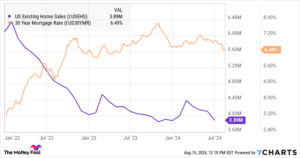Think You’re Saving Enough? Here’s What the Top 10% Have Saved for Retirement


People spend their lives working with the hope of one day enjoying a retirement that truly reflects their dreams. Maybe you imagine yourself relaxing on a sun-soaked beach, tending to your garden, or even traveling the world – whatever your ideal retirement looks like, having the financial means to support it is key.
Don’t Miss:
For many Americans, that means aiming to be among the top 10 percent of retirement savers. But what exactly does it take to get there?
Experts say that accumulating at least $2.5 million in retirement savings is a solid target for those who want to join the top 10 percent of retirees.
Trending: Founder of Personal Capital and ex-CEO of PayPal re-engineers traditional banking with this new high-yield account — start saving better today.
But Why $2.5 Million?
The $2.5 million goal isn’t just a random figure. It’s a number that considers the realities of longer life expectancies, rising health care costs, and inflation. With these factors in play, this amount is considered enough to provide a steady income throughout retirement.
If you follow the 4% rule – a guideline suggesting you withdraw 4% of your retirement savings each year –$2.5 million could give you around $100,000 annually. That’s a comfortable income for many retirees, allowing you to live your dream retirement without worrying about finances.
See Also: Can you guess how many Americans successfully retire with $1,000,000 saved? The percentage may shock you.
How to Reach the Top 10%
Reaching this level of retirement savings doesn’t just happen; it takes smart planning, disciplined saving, and wise investing. Here’s how you can work toward it:
The earlier you start saving, the better. Time is your best friend when it comes to building up retirement wealth. Consistently contributing to retirement accounts like a 401(k) or IRA is crucial, and if your employer offers a matching program, it’s important to take full advantage of it. The power of compound interest over time is significant.
Diversifying your investment portfolio is important for managing risk and optimizing returns. By spreading your investments across different asset classes – like stocks, bonds, and real estate – you can protect yourself against market volatility. As you get closer to retirement, adjusting your investment mix to reduce risk and preserve your savings is important.
Trending: The number of ‘401(k)’ Millionaires is up 43% from last year — Here are three ways to join the club.
-
Live Below Your Means
Living below your means is an effective way to free up more money for savings. The key is to create a budget that prioritizes retirement savings over unnecessary spending. It’s all about focusing on your long-term goals rather than short-term gratification. Every dollar you save today is a dollar that can work for you in the future.
-
Get Professional Advice
Consulting with a financial advisor can be invaluable. A good advisor can provide personalized insights into your retirement planning, helping you tailor your investment strategies to your specific risk tolerance and financial goals. They can help you stay on track to hit your savings target.
Reaching the top 10% of retirement savings might seem like a big challenge, but it’s achievable with careful planning and disciplined execution. By starting early, diversifying your investments, living within your means, and seeking professional advice, you can work toward a financially secure retirement that lets you live the life you’ve always dreamed of. The key is to develop a plan that fits your personal goals and circumstances, ensuring you can enjoy your retirement years with peace of mind.
Read Next:
“ACTIVE INVESTORS’ SECRET WEAPON” Supercharge Your Stock Market Game with the #1 “news & everything else” trading tool: Benzinga Pro – Click here to start Your 14-Day Trial Now!
Get the latest stock analysis from Benzinga?
This article Think You’re Saving Enough? Here’s What the Top 10% Have Saved for Retirement originally appeared on Benzinga.com
© 2024 Benzinga.com. Benzinga does not provide investment advice. All rights reserved.








